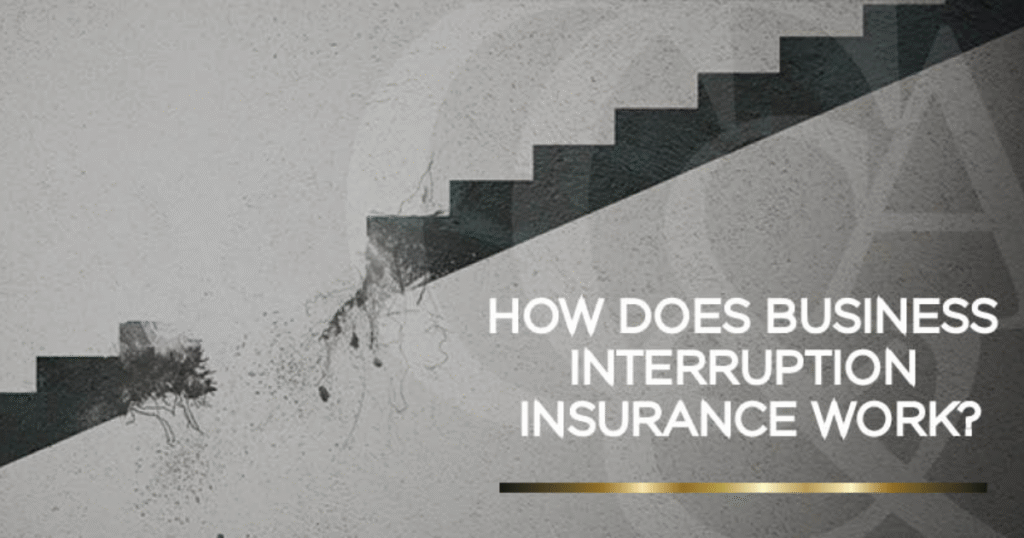Introduction
In the unpredictable world of business, crises can strike without warning—natural disasters, fires, cyberattacks, or pandemics. Such events can halt your operations, disrupt cash flow, and jeopardize your company’s survival. This is where business interruption insurance plays a crucial role. It serves as a financial lifeline, helping businesses recover and continue operations despite unexpected shutdowns.
This comprehensive article explores how business interruption insurance works, why it is essential, what it covers, and how it can protect your business during crises.
What Is Business Interruption Insurance?

Definition and Purpose
Business interruption insurance (also known as business income insurance) is designed to compensate a business for lost income and ongoing expenses when operations are disrupted due to a covered event. Unlike property insurance that covers physical damage, business interruption insurance focuses on the financial impact of business downtime.
Why Is It Important?
Without steady income, even a short-term closure can lead to mounting bills, employee layoffs, and potentially permanent closure. Business interruption insurance mitigates these risks by providing funds to cover lost revenue, fixed expenses, and sometimes extra costs needed to resume operations quickly.
Common Causes of Business Interruption
Natural Disasters
Floods, hurricanes, earthquakes, wildfires, and other natural catastrophes can damage facilities or make them inaccessible.
Fire and Property Damage
Fires are one of the most common causes of business interruption, destroying property and equipment.
Cyberattacks and Data Breaches
Modern businesses face digital threats that can force them offline or disrupt customer access.
Supply Chain Disruptions
Delays or stoppages in the supply chain can halt production or sales.
Pandemics and Public Health Crises
Events like the COVID-19 pandemic highlighted the importance of coverage for forced closures and reduced business activity.
What Does Business Interruption Insurance Cover?
Lost Income
The policy covers the net income your business would have earned if no interruption had occurred, helping maintain financial stability.
Operating Expenses
Costs like rent, utilities, employee salaries, and loan payments continue even when operations stop. Insurance helps cover these ongoing expenses.
Temporary Location Expenses
If your business needs to relocate temporarily to continue operations, some policies reimburse those costs.
Extra Expenses
Sometimes you need to spend more than usual to minimize the disruption, such as expedited shipping or equipment rentals. These are often covered.
Civil Authority Orders
Coverage may extend to losses caused by government-mandated closures or restrictions preventing access to your business premises.
How Business Interruption Insurance Works

Triggering Events
To claim, the interruption must result from a covered peril under your insurance policy. Not all causes are automatically included; reading policy terms is vital.
Waiting Period
Most policies have a waiting period or deductible—typically 48 to 72 hours—before coverage kicks in.
Loss Calculation
The insurer calculates lost income based on previous financial records, usually from tax returns or profit and loss statements.
Claim Process
You must promptly notify the insurer, document damages, and provide financial evidence to support your claim.
Benefits of Business Interruption Insurance
Financial Stability During Uncertainty
It ensures your business can meet financial obligations despite halted operations.
Employee Retention
Funds from insurance can help keep staff employed during crises.
Faster Recovery
Coverage for extra expenses helps you resume operations sooner, minimizing long-term losses.
Protects Business Reputation
Being able to continue or quickly resume service maintains customer trust.
Peace of Mind
Knowing you are covered allows you to focus on managing the crisis effectively.
Who Needs Business Interruption Insurance?
Small and Medium Enterprises
Smaller businesses often lack sufficient reserves to survive extended shutdowns, making coverage essential.
Retailers and Restaurants
These businesses rely heavily on foot traffic and can face significant income loss when closed.
Manufacturers and Suppliers
Disruptions in production lines can cause extensive revenue loss.
Service Providers
Even service businesses like law firms, consultancies, or salons are vulnerable to interruptions.
Home-Based Businesses
While some policies exclude home-based operations, specialized coverage options exist.
How to Choose the Right Business Interruption Insurance

Assess Your Risks
Understand the specific threats your business faces based on location, industry, and operations.
Calculate Potential Losses
Estimate how much income you might lose during various interruption scenarios.
Review Coverage Limits
Make sure the policy’s payout limits align with your financial needs.
Check Policy Exclusions
Common exclusions include floods, earthquakes, and pandemics unless specifically added.
Bundle with Property Insurance
Business interruption insurance often comes as an add-on or part of a business owner’s policy (BOP).
Work With Experienced Agents
Insurance professionals can help tailor your coverage to your unique needs.
Common Misconceptions About Business Interruption Insurance
“My Property Insurance Covers Everything”
Property insurance pays for physical damages but usually doesn’t cover lost income or extra expenses.
“Business Interruption Insurance Is Too Expensive”
While it adds to premiums, the cost is relatively low compared to the potential losses it covers.
“It Covers All Types of Interruptions”
Coverage is limited to perils specified in your policy; not all disruptions qualify.
“Claims Are Always Denied”
Claims are approved when properly documented and meet policy conditions.
Case Studies: Business Interruption Insurance in Action
Fire in a Retail Store
A local clothing store’s premises caught fire, forcing closure for two months. The insurance covered rent, payroll, and lost sales, enabling the business to reopen without debt.
Cyberattack on a Tech Firm
After a ransomware attack locked critical systems, business interruption insurance reimbursed the tech company for lost income during recovery and the costs of temporary solutions.
Flood Damage in a Restaurant
A flood forced a restaurant to close for repairs. Business interruption insurance covered income loss and relocation expenses to a temporary venue.
Tips to Maximize Your Business Interruption Coverage
Keep Accurate Financial Records
Maintain updated income statements and expense reports to support claims.
Regularly Review and Update Policies
Adjust coverage as your business grows or changes.
Understand Your Waiting Periods
Know how long you must endure downtime before coverage starts.
Consider Additional Riders
Add flood, earthquake, or pandemic coverage if needed.
Communicate Clearly with Your Insurer
Prompt and transparent communication speeds up claims processing.
Also Read : Common Reasons Why Insurance Claims Get Rejected
Conclusion
Business interruption insurance is an indispensable tool that can save your company during times of crisis. By protecting your revenue stream and covering ongoing expenses when operations halt unexpectedly, it offers a critical buffer that allows your business to survive and thrive despite unforeseen challenges.
Many businesses underestimate the risks or the importance of this coverage until disaster strikes. However, proactively securing comprehensive business interruption insurance ensures financial stability, supports employee retention, and accelerates recovery.
With the right insurance plan, you gain peace of mind knowing that your company’s future is safeguarded against the unpredictable disruptions that lie ahead.
Frequently Asked Questions (FAQs)
What events typically trigger business interruption insurance?
Most policies cover perils like fire, storms, vandalism, and civil authority closures. Coverage for floods, earthquakes, or pandemics often requires additional endorsements.
How long does business interruption insurance cover losses?
Coverage typically extends until the business resumes normal operations or reaches the policy’s time limit, often 12 months.
Can I get business interruption insurance as a standalone policy?
Usually, it is offered as part of property insurance or a business owner’s policy but can sometimes be purchased separately.
How is the amount of lost income calculated?
Insurers use historical financial data, like tax returns and profit/loss statements, to estimate expected income during the interruption period.
Does business interruption insurance cover employee salaries?
Yes, it generally covers payroll expenses to help retain employees during downtime.
Are there exclusions I should watch out for?
Yes, common exclusions include damage caused by floods, earthquakes, war, and pandemics unless specifically included.
How soon should I file a claim after a business interruption?
Notify your insurer as soon as possible, ideally within the timeframe specified in your policy.
Does business interruption insurance cover supply chain disruptions?
Coverage for supply chain interruptions varies and often requires special endorsement.
How can I lower my business interruption insurance premiums?
Implementing risk mitigation measures and bundling policies can help reduce costs.
Is business interruption insurance worth the investment?
For most businesses, yes. It offers critical protection that can mean the difference between closure and survival.




